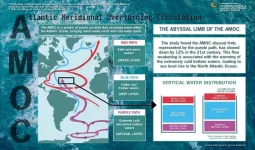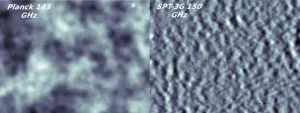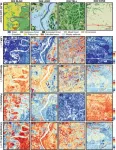(Press-News.org)
Graphic
Climate change will increase the future value of residential rooftop solar panels across the United States by up to 19% by the end of the century, according to a new University of Michigan-led study.
The study defines the value of solar, or VOS, as household-level financial benefits from electricity bill savings plus revenues from selling excess electricity to the grid—minus the initial installation costs.
For many U.S. households, increased earnings from residential rooftop solar could total up to hundreds of dollars annually by the end of the century, say the authors of the study, which is scheduled for publication April 19 in the journal Nature Climate Change.
"Given the average 25-year lifespan of a rooftop solar installation, a system built today will nearly experience 2050 weather," said study senior author Michael Craig, assistant professor of energy systems at the U-M School for Environment and Sustainability and of industrial and operations engineering at U-M's College of Engineering.
"So, it's important for households to think of future value when building solar. If households do so, our findings indicate they would see even greater value from solar, and might decide to build more."
Public awareness of the increased future value of rooftop solar could spur greater adoption of the technology, which in turn could accelerate efforts to decarbonize the power-generation system in the United States and globally, the study shows.
The expected financial gains seen in the study were driven largely by increased demand for residential air-conditioning as the climate warms. The other key factor affecting the value of rooftop photovoltaic systems, the researchers say, is future solar-panel performance in response to climate change.
Craig and colleagues analyzed data from 2,000 households in 17 U.S. cities and estimated air-conditioning demand and solar-panel performance under future climates using a moderate climate-warming scenario called RCP-4.5.
The value of rooftop solar panels increased in nearly all the cities, in both warm and cold locations. Miami saw the largest increase in value, while only Minneapolis saw a decrease in the financial benefits of rooftop solar for households.
"This is the first study to quantify the value of rooftop solar under climate change, and we show that households across the U.S. will realize greater cost savings from rooftop solar under future weather than under historic weather," said study lead author Mai Shi, a former U-M visiting doctoral student now at Tsinghua University in Beijing.
As home-cooling demands rise, a greater proportion of solar-generated electricity will be used to cool the home, rather than being sold to the electrical grid, benefiting owners of rooftop solar systems, according to the study.
That's because—in many states—solar energy used to power a home reduces the homeowner's electric bill by the full retail cost of electricity, while electricity that is sent to the grid is credited at a lower rate.
"Greater cooling demand means more solar power is consumed at the household rather than sent back to the grid," Craig said. "And it's generally more valuable for a rooftop photovoltaic owner to consume the power generated by their PV panel, rather than exporting it to the grid."
Under the moderate RCP-4.5 climate scenario, demand for residential space cooling is expected to increase in all 17 cities studied. Cooling demand will increase by an average of 35% by mid-century and by an average of 64% by the end of the century, across all households in all of the cities, the researchers say.
The other key factor affecting the future value of residential rooftop photovoltaics is solar-panel performance in response to rising air temperatures and changes in cloud cover.
Solar panels work best in cool, sunny weather. As air temperature or cloud cover increase, the amount of electricity generated by a solar panel declines. The study found that future solar-panel performance will vary from place to place across the U.S., depending on weather conditions.
In cities such as Ann Arbor, Austin, Chicago, Dallas, Detroit, Houston, Louisville and Milwaukee, rising air temperatures will decrease solar panel efficiency, but reduced cloud cover will likely increase the amount of sunlight reaching panels, on average. The two factors "are opposing but roughly comparable," meaning they cancel each other out, the researchers say.
But cities such as Baltimore, Boston, Los Angeles, Minneapolis, New York City and Phoenix are expected to be both warmer and cloudier in response to climate change, which will "significantly decrease" the electrical output of rooftop solar.
Even so, increased cooling demand in all 17 cities will likely outweigh changes in panel electrical output, resulting in financial gains for owners of rooftop solar in nearly every case, according to the study. Minneapolis, where limited future increases in cooling demand will combine with decreased electrical output from rooftop solar panels, is an exception.
While future financial gains from rooftop solar will be reaped mainly by households that can afford to install panels, various programs are in place to increase accessibility, so that more people share in the anticipated benefits, Craig says.
For example, there are programs that defray the costs of solar, opening it up to lower-income individuals. Governments can also install rooftop solar on public buildings, such as subsidized housing, to cover the capital costs while providing solar benefits to tenants. And community solar programs can benefit entire communities, including households that lack the means or ability to access rooftop solar themselves.
In addition to Craig and Shi, the other author of the Nature Climate Change paper is Xi Lu of Tsinghua University.
The study was supported by the National Key R&D Program of China, U.S. National Science Foundation, National Natural Science Foundation of China and Carbon Neutrality and Energy System Transformation Project.
Study: Climate change will impact the value and optimal adoption of residential rooftop solar (DOI 10.1038/s41558-024-01978-4) (available once embargo lifts)
END
Climate change will increase value of residential rooftop solar panels across US, study shows
2024-04-19
ELSE PRESS RELEASES FROM THIS DATE:
Could the liver hold the key to better cancer treatments?
2024-04-19
PHILADELPHIA – Liver inflammation, a common side-effect of cancers elsewhere in the body, has long been associated with worse cancer outcomes and more recently associated with poor response to immunotherapy. Now, a team led by researchers from the Abramson Cancer Center and Perelman School of Medicine at the University of Pennsylvania has found a big reason why.
In their study, published today in Nature Immunology, the researchers discovered that cancer-induced liver inflammation causes liver cells to secrete proteins called serum amyloid A (SAA) proteins, which circulate through the body and hinder the ability of T cells—major anticancer weapons of the immune system—to ...
Warming of Antarctic deep-sea waters contribute to sea level rise in North Atlantic, study finds
2024-04-19
Analysis of mooring observations and hydrographic data suggest the Atlantic Meridional Overturning Circulation deep water limb in the North Atlantic has weakened. Two decades of continual observations provide a greater understanding of the Earth’s climate regulating system.
A new study published in the journal Nature Geoscience led by scientists at University of Miami Rosenstiel School of Marine, Atmospheric, and Earth Science, and the National Oceanic and Atmospheric Administration’s Atlantic ...
Study opens new avenue for immunotherapy drug development
2024-04-19
HOUSTON ― In a new study published today in Nature Biomedical Engineering, researchers at The University of Texas MD Anderson Cancer Center have designed a new method for developing immunotherapy drugs using engineered peptides to elicit a natural immune response inside the body.
In preclinical models of locally advanced and metastatic breast cancer, this method improved tumor control and prolonged survival, both as a monotherapy and in combination with immune checkpoint inhibitors.
“Amino acids are the building blocks of life and, when a few of them are linked together, they create a peptide. ...
Baby sharks prefer being closer to shore, show scientists
2024-04-19
Remember #BabyShark? And no, this was not the very catchy song for kids that took the internet by storm. Earlier this year, social media was abuzz with stunning footage of a newborn great white shark, captured by a flying drone.
Now, marine scientists have shown for the first time that juvenile great white sharks select warm and shallow waters to aggregate within one kilometer from the shore. These results, published in Frontiers in Marine Science, are important for conservation of great white sharks – especially as ocean temperatures increase due ...
UBC research helps migrating salmon survive mortality hot-spot
2024-04-19
When Kevin Ryan and the other hardworking volunteers at Mossom Creek Hatchery in Port Moody, B.C. release young coho smolts into the ocean, they’re never quite certain how many will return as adults.
Mossom releases between 5,000 and 10,000 coho smolts each year, and is one of the few hatcheries to release coho directly into the ocean, rather than into a river. Until now, no research had looked at the success of direct ocean releases of coho.
UBC researchers used acoustic telemetry to tag and track coho on their journey. The results were revealing: ...
Technical Trials for Easing the (Cosmological) Tension
2024-04-19
Thanks to the dizzying growth of cosmic observations and measurement tools and some new advancements (primarily the “discovery” of what we call dark matter and dark energy) all against the backdrop of General Relativity, the early 2000s were a time when nothing seemed capable of challenging the advancement of our knowledge about the cosmos, its origins, and its future evolution.
Even though we were aware there was still much to uncover, the apparent agreement between our observations, calculations, and theoretical framework was indicating that our knowledge of the universe was set to grow significantly and without ...
Mapping plant functional diversity from space: HKU ecologists revolutionize ecosystem monitoring with novel field-satellite integration
2024-04-19
An international team of researchers, led by Professor Jin WU from the School of Biological Sciences at The University of Hong Kong (HKU), has made a promising advancement in mapping plant functional traits from space using time-series satellite data. The study, published in Remote Sensing of Environment, showcases the innovative combination of the Sentinel-2 satellite mission and its dynamic time-series capabilities. This innovative approach not only unlocks a deeper understanding of essential foliar traits, providing crucial insights ...
Lightweight and flexible yet strong? Versatile fibers with dramatically improved energy storage capacity
2024-04-19
The latest wearable devices, such as Samsung's Galaxy Ring and Apple's Vision Pro, are taking healthcare a step further and even enabling people to work virtually. Given the characteristics of wearable devices that require them to be small and lightweight, there is an inevitable limitation on battery capacity, still presenting a technical barrier to incorporating a variety of functions. In order for wearable devices to fully realize the imagined life, it is necessary to develop a lighter and more fromlessenergy storage method.
The Korea Institute of Science and Technology (KIST) announced that a joint research team led by Dr. Hyeonsu Jeong ...
3 ways to improve diabetes care through telehealth
2024-04-19
Grocery stores, airports and beaches aren’t great places to have telehealth visits with your endocrinologist. But home can be one of the best locations, giving a doctor helpful insights into a patient’s home environment, which can positively impact their care.
This is just one finding shared in a new study published this week in The Journal of Clinical Diabetes.
Researchers interviewed clinicians and staff who provide diabetes care through telehealth across four University of California academic medical ...
A flexible and efficient DC power converter for sustainable-energy microgrids
2024-04-19
A new DC-DC power converter is superior to previous designs and paves the way for more efficient, reliable and sustainable energy storage and conversion solutions. The Kobe University development can efficiently interface with a wide range of energy sources while enhancing system stability and simplicity at an unprecedented efficiency.
Electric power comes in two kinds, AC (alternating current) and DC (direct current). Famously, the question over which kind should be used for national power grids, the “Current War” of the late 19th century, got settled in favor of AC and most power plants today produce ...








